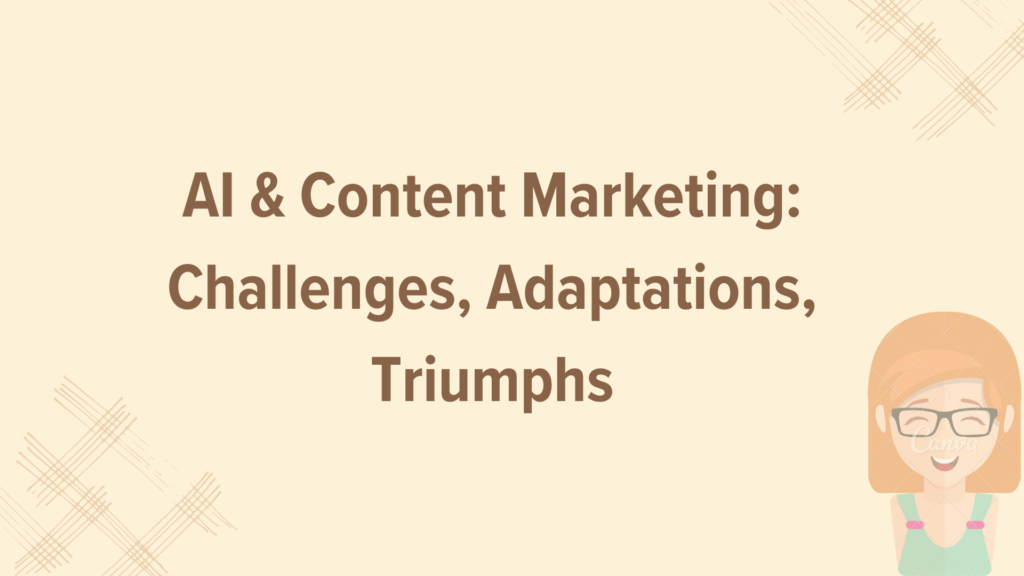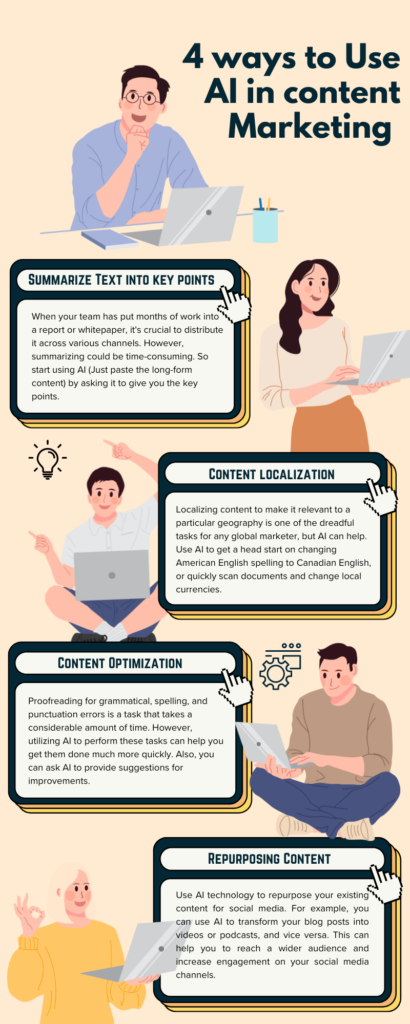
One of the common buzzes that we often hear these days is AI replacing the jobs of content writers, creators, and marketers. With AI gaining momentum and sophisticated tools like ChatGPT emerging, this notion seems to hold some truth with the market for AI in content marketing projected to reach $107.5 billion by 2028, up from $15.84 billion in 2021. But what most people don’t understand is it’s not AI itself but rather those who harness its power effectively that are transforming the industry. So, let’s delve into the intersection of AI and content marketing and how can marketers use AI to leverage their work.
But what is Content Marketing?
Content marketing is the development and distribution of relevant, useful content—blogs, newsletters, white papers, social media posts, emails, videos, and the like—to current and potential customers. When executed effectively, it not only showcases a brand’s expertise but also enhances its visibility in search engines, attracts new customers, and fosters customer relationship/loyalty. Simply put, we need content marketing to improve the brand’s image, visibility, and success.
This naturally puts marketers under immense pressure to produce and publish a high volume of content quickly to boost SEO and attract leads. According to a survey conducted by Capterra in 2022, 45% of marketers spend about half of their time creating marketing content in a typical workweek. More than a third are spending about 75% of their total time on content work.
AI — a quicker way to do things, but is it better?
However, this took a huge turn when tools like ChatGpt came into existence. Even though people were initially hesitant to adapt to it, they started using AI to generate content thus saving time and yet churning out high volumes of content. As per Hubspot’s report: About 45% of marketers use generative AI to create content which saves them about 3+ hours of work per piece.
Although AI cannot replace the skills of a professional writer, it can churn out content at an impressive speed, allowing marketers to achieve their ultimate goal—create more content, faster. It also enabled marketers to create high volumes of content by incorporating keywords, thereby improving their ranking in search engines. But this also has a downside, as 96% of the time, AI-generated content is not complete enough to publish on its own without editing and personalization.
From paradise to pitfalls: Consequences of AI-driven content creation
The ease of content creation with AI has led to an influx of low-quality SEO content, disrupting search engine results. To overcome this, Google came out with an update in March 2024. One of the key points from their official release statement read:
“This update involves refining some of our core ranking systems to help us better understand if webpages are unhelpful, have a poor user experience, or feel like they were created for search engines instead of people.”
https://blog.google/products/search/google-search-update-march-2024/
This was specifically targeted at AI-generated SEO copy on the internet.
Also, companies like Google and Bing have begun incorporating generative AI, such as Google Bard into their search algorithms, which will give users answers created by AI. This will eventually stop users from scrolling down the search results to find a blog. So, at some point in the near future, SEO itself might not be relevant. So, it’s time for marketers to level up and come up with content to stand out now more than ever before.
But if you ask me, is this an end to AI-generated copy in marketing or should you stop using it? No, absolutely not. For example, AI can be used to brainstorm ideas (as there’s nothing worse than running out of ideas), review the content to help structure it better, or check for grammar and spelling issues.

If there’s an end to SEO, what else is left in Content Marketing?
Despite the potential shift away from traditional SEO, content marketing remains indispensable. Therefore, we, as marketers, should focus on other platforms and content to educate, connect, and engage with users —such as—YouTube is the second largest search engine where people look for information. For a brand, this is an opportunity to flesh out video content such as how-to videos, podcasts, interviews, recorded webinars and more to reach their target audience. This also opens avenues to repurpose the content to produce short-form content ideal for TikTok, Instagram, and Facebook. This is where the future of SEO and search is headed to.
But, do humans still make a difference?
Yes, as much as AI can be helpful in creating content, we shouldn’t be overly dependent on it. And, we still need a human to make a difference as only humans can bring in the following to any form of content.
Creativity and originality: Humans can elevate content, engaging audiences with perspective and uniqueness, in terms of tone and voice, standing out amidst AI-generated materials.
Subject matter expertise: Content marketers possess deep knowledge, critical thinking, and expertise to curate insightful content tailored to audience needs, surpassing AI’s capabilities.
Personalization and adaptation: Skilled creators thrive on context, adapting content for varied mediums and demographics, ensuring relevance and effective communication.
Emotional intelligence: Content creators leverage emotional understanding to connect deeply with audiences, fostering trust and loyalty, a vital edge over AI in building relationships.
Wrapping up
The future is intelligent, not artificial. As AI continues to evolve, it is not a threat to content marketers but, on the contrary, it supports marketers to think better and act faster.
With the right strategy and in-house team, brands can also produce podcasts, videos, webinars, and live events that create the opportunity for the audience to truly connect and engage with the brand, thus positioning them as a leader and a brand that values its customers.
And so, AI can be an effective tool in the future of content marketing by enabling marketers to work more efficiently, which will, in turn, facilitate genuine conversations among people in communities built and nourished by subject matter experts and engaged participants.


Leave a Reply